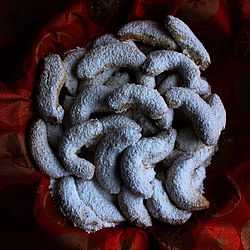Vanillekipferl
| Vanillekipferl | |
|---|---|
| Biscuit | |
 | |
| Place of origin: | |
| Austria | |
| Region or state: | |
| Vienna | |
| Main ingredient(s): | |
| Almonds or nuts, vanilla | |
| Recipes at Wikibooks: | |
|
| |
| Media at Wikimedia Commons: | |
|
|
Vanillekipferl are Austrian, German, Czech, Slovak and Hungarian small, crescent shaped biscuits. They are usually made with ground almonds or hazelnuts. They get their typical flavour from a heavy dusting of vanilla sugar.
Origins
Vanillekipferl originate from Vienna in Austria and is a specialty of the Bavarian town of Nördlingen. Traditionally, they are made at Christmas, are very well known in Europe.[1] Thus, they can be enjoyed all year round and are often for sale in Viennese coffee shops. They are said to have been created in the shape of the Turkish crescent moon symbolizing[2] the celebration of the victory of the Hungarian army over the Turkish in one of the many wars between the nations.
They are also widely baked in Germany and are common in Hungary, Czech Republic, Romania, and Slovakia as a part of the typical Christmas baking. Since in Germany the Advent is celebrated by several denominations of Christianity on the four Sundays preceding Christmas, many kinds of biscuits and sweets are consumed during this time and have become typical for winter time.
Unlike other pastries, this particular kind is difficult to bake. The batter used when hardened is very fragile. It takes a skilled pair of hands to create the “kipferl” or the horse –shoe shape without breaking the biscuit.
References
- ↑ Christmas Time in Austria Retrieved 16 July 2013
- ↑ Vanillekipferl Retrieved 16 July 2013
See also
| Wikimedia Commons has media related to Vanillekipferl. |